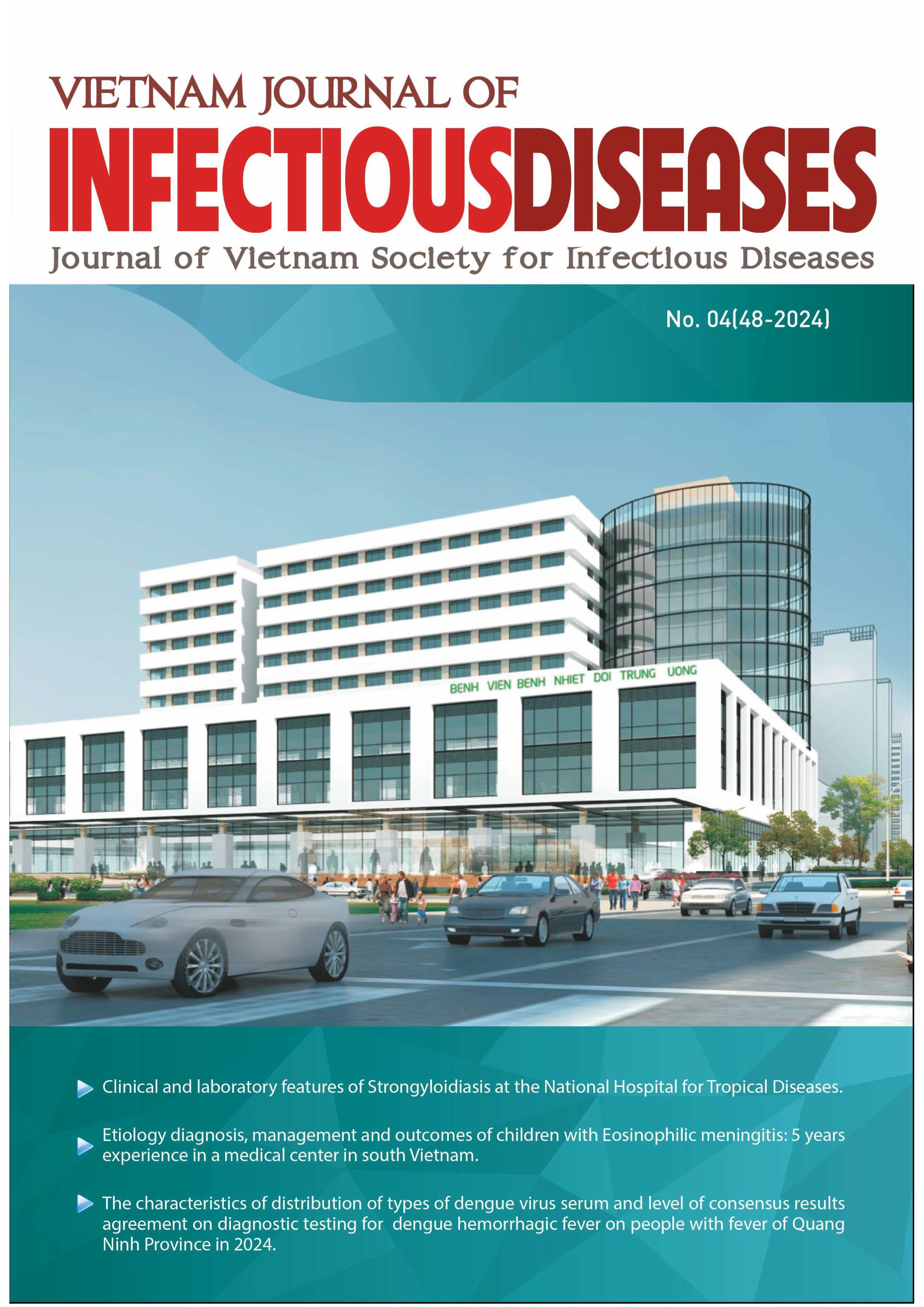THE VALUE OF ELISA METHOD FOR MEASURING ANTI-VINCULIN ANTIBODIES IN THE DIAGNOSIS OF BLEEDING ULCERATIVE COLITIS AND DIARRHEA-PREDOMINANT IRRITABLE BOWEL SYNDROME AT THANH NHAN HOSPITAL IN 2023
Nội dung chính của bài viết
Tóm tắt
Objectives: To evaluate the diagnostic value of the ELISA method for measuring anti-vinculin antibodies in the diagnosis of bleeding ulcerative colitis (UC) and diarrhea-predominant irritable bowel syndrome (IBS-D) at Thanh Nhan Hospital in 2023.
Subjects and methods: This was a cross-sectional study conducted with 150 participants, including 30 healthy individuals, 50 patients with UC, and 70 patients with IBS-D. The patients were examined and treated at Thanh Nhan Hospital from January 2023 to June 2024.
Results: The average duration of disease for patients with UC and IBS-D was 2.8 ± 2.0 years and 2.9 ± 4.7 years, respectively. The average age of UC and IBS-D patients was 46.8 ± 13.7 years and 48.4 ± 12.0 years, respectively. The average level of anti-vinculin antibodies in the UC and IBS-D groups was 372.0
± 196.1 (µg/g) and 587.7 ± 315.7 (µg/g), respectively. With an anti-vinculin antibody threshold in serum of 535.8 ng/mL (1.8 OD), the diagnostic value for distinguishing IBS-D from healthy individuals had a sensitivity of 50% and a specificity of 87.5%.
Conclusions: The level of anti-vinculin antibodies in the IBS-D group (539.2 ± 299.3 ng/mL) was significantly higher than in the healthy control group (345.8 ± 126.2 ng/mL) and the UC group (372.0 ± 196.1 ng/mL) with p < 0.001. With a serum anti-vinculin antibody cutoff value greater than 535.8 ng/mL
(1.8 OD), there is significant diagnostic value in distinguishing between healthy individuals and IBS-D patients, with sensitivity and specificity of 50.0% and 87.5%, respectively.
Chi tiết bài viết
Từ khóa
Anti-vinculin antibodies, Ulcerative colitis, Diarrhea-predominant irritable bowel syndrome, Thanh Nhan Hospital
Tài liệu tham khảo
2. Di Rosa C, Altomare A, Terrigno V, Carbone F, Tack J, Cicala M, et al. Constipation-Predominant Irritable Bowel Syndrome (IBS-C): Effects of
Different Nutritional Patterns on Intestinal Dysbiosis and Symptoms. Nutrients. 2023 Mar 28;15(7):1647.
3. Schmulson M, Balbuena R, Corona de Law C. Clinical experience with the use of anti-CdtB and anti-vinculin antibodies in patients with diarrhea in Mexico. Rev Gastroenterol Mex. 2016;81(4):236-9.
4. Pimentel M, Morales W, Rezaie A, Marsh E, Lembo A, Mirocha J, et al. Development and validation of a biomarker for diarrhea-predominant
irritable bowel syndrome in human subjects. PloS One. 2015;10(5):e0126438.
5. Pavlidis P, Chedgy FJ, Tibble JA. Diagnostic accuracy and clinical application of faecal calprotectin in adult patients presenting with gastrointestinal symptoms in primary care. Scand J Gastroenterol.
2013 Sep;48(9):1048-54.
6. Mindemark M, Larsson A. Ruling out IBD: estimation of the possible economic effects of preendoscopic screening with F-calprotectin. Clin
Biochem. 2012 May;45(7-8):552-5.
7. Analytical and clinical performance of the fully-automated LIAISONXL calprotectin immunoassay from DiaSorin in IBD patients - PubMed [Internet]. [cited 2024 Sep 4]. Available from: https://pubmed.ncbi.nlm.nih.gov/32637525/
8. Cosnes J, Gower-Rousseau C, Seksik P, Cortot A. Epidemiology and natural history of inflammatory bowel diseases. Gastroenterology. 2011 May;140(6):1785-94.
9. Zaki MES, Elhammady D, Foda Salama M, Abdelsalam M, Osman AOB. Study of Antibodies to Cytolethal Distending Toxin B (CdtB) and Antibodies to Vinculin in Patients with Irritable Bowel Syndrome.
F1000Research. 2021 Oct 15;10:303.
10. Zhan H, Chen H, Liu C, Cheng L, Yan S, Li H, et al. Diagnostic Value of D-Dimer in COVID-19: A Meta-Analysis and Meta-Regression. Clin Appl Thromb Off J Int Acad Clin Appl Thromb. 2021;27:10760296211010976.
11. Gao YD, Ding M, Dong X, Zhang JJ, Kursat Azkur A, Azkur D, et al. Risk factors for severe and critically ill COVID-19 patients: A review. Allergy. 2021 Feb;76(2):428-55.
12. Pimentel M. Update on Irritable Bowel Syndrome Diagnostics and Therapeutics. Gastroenterol Hepatol. 2016 Jul;12(7):442-5.


